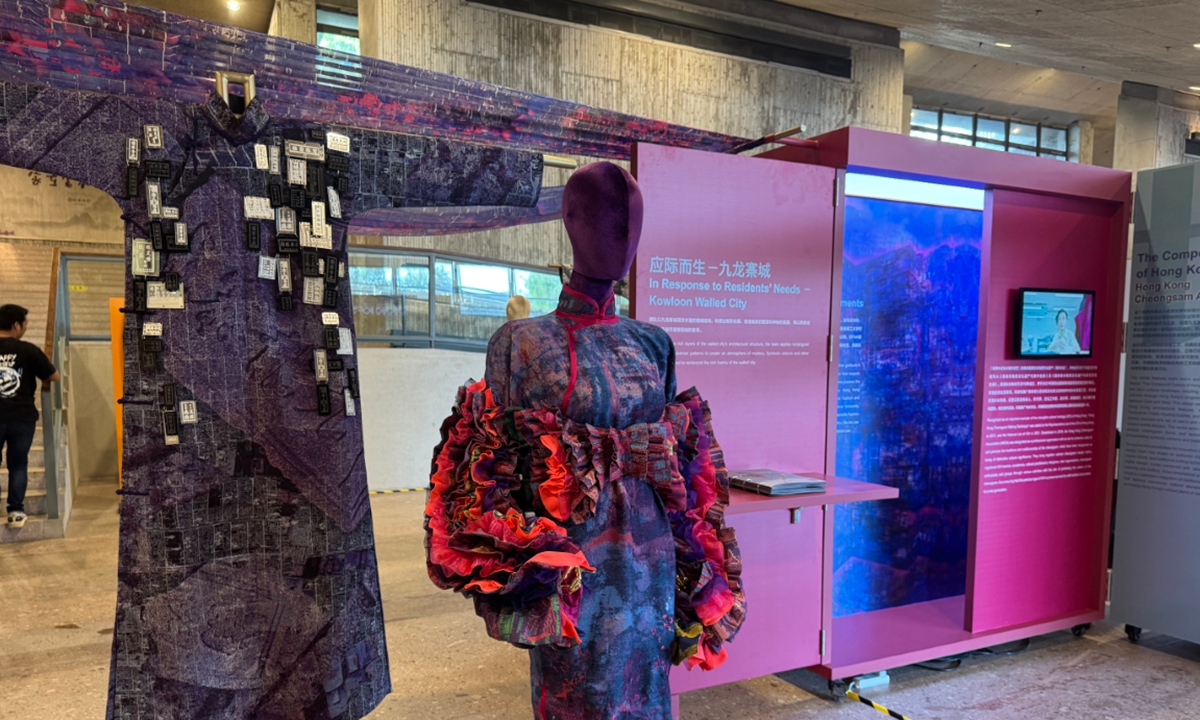
An installation from the Hong Kong Cheongsam Association at the Art Biennale Photo: Xu Liuliu/GT
With “integration and dialogue” as the theme, the 2024 Hong Kong-Macao Visual Art Biennale kicked off on Friday in Hangzhou, East China’s Zhejiang Province. Young artists from Hong Kong, Macao, and Zhejiang are expected to present a visual feast for audiences to explore the interplay between tradition and modernity, the East and the West, diversity and local culture shaping contemporary culture, and conduct exchanges with other artists, curators, and cities through artwork.
“Four sets of installations from young Hong Kong artists have showcased the characteristics of Hong Kong, a city that blends the East and the West, and modernity and tradition,” Tam Mei Yee, deputy director of Leisure and Cultural Services (Culture) of the Hong Kong Special Administrative Region (HKSAR) Government told the Global Times in an exclusive interview on Friday.
“The Biennale and other events including the ongoing Guangdong-Hong Kong-Macao Greater Bay Area Culture and Arts Festival highlight Hong Kong’s potential as a hub for cultural exchanges, in line with the goals outlined in our country’s 14th Five-Year Plan (2021-25) to support the development of East-meets-West center for international cultural exchange in Hong Kong,” added Tam.
Since the new HKSAR government took office in July 2022, it has been actively promoting cultural development, focusing on capturing the unique creative atmosphere of Hong Kong’s blend of Chinese and foreign cultures.
Snapshots and city walks
The Hong Kong section themed “HK Snapshots & City Walks,” curated by the Hong Kong Heritage Museum, explores the legacy of the Lingnan School of Painting and innovation in intangible cultural heritage through the concept of “street pop-ups.”
According to Tang Man-leung, curator at Hong Kong Heritage Museum, this approach highlights how young Hong Kong artists breathe new life into traditional crafts, and showcases the city’s blend of old and new, and Eastern and Western lifestyles, which exemplify the creativity and dynamism born from Hong Kong’s successful cultural integration.
“We need to return to the roots of our traditional cultures and discover the diversified cultural elements to present their vitality and something interesting and fresh,” said Tam.
In an international and modern metropolis like Hong Kong, “It is important to explore how we understand and discover our profound cultural traditions and perform different interpretations with modern and contemporary artistic approaches.”

Opera headdresses on display at the Hong Kong-Macao Visual Art Biennale in Hangzhou, East China’s Zhejiang Province Photo: Xu Liuliu/GT
Rebecca Lo, a fourth-generation Lingnan painter, selected Hong Kong’s urban landmarks, natural landscapes, birds, flowers, and harbor scenery as subjects for the five sets of eight porcelain plates she created, to make up a total of 40 porcelain items. Skillfully combining the Lingnan School of Painting style with the vibrant colors typical of Western painting, Lo created a series of vivid images on the plates by applying exquisite rendering techniques to represent natural light and shadow. Her paintings are like capturing the beauty of everyday Hong Kong through a camera lens.
An important example of the intangible cultural heritage (ICH) of Hong Kong, the Hong Kong Cheongsam Making Technique was added to the Representative List of the ICH of Hong Kong in 2017, and the National List of ICH in 2021.
The Hong Kong Cheongsam Association (HKCA) has brought a series of designs inspired by the city’s rich cultural elements including the textiles and decorations seen within bamboo theater, such as paper crafts and costume embellishments, its unique public housing estates, and the Kowloon Walled City.
“The Hong Kong-Macao Visual Art Biennale is a bridge that uses art as a medium to promote dialogue and communication, and to facilitate a heart-to-heart connection through mutual reflection, thereby stimulating greater creative vitality,” writes Leong Wai Man, president of the Cultural Affairs Bureau of the Government of the Macao Special Administrative Region.
Typical Macao
The Macao section, curated by the Division of Visual Art of the Cultural Affairs Bureau, presents the evolving narrative of Macao through the everyday stories of artists living and working in Macao, offering personal perspectives to reflect the changing perceptions and understandings of Macao.
In the areas of culture and art, the East-West encounter and the great diversity have led to considerable development, while exchanges and cooperation with the Chinese mainland and Hong Kong have become increasingly close.
We will continue to consolidate our role as a “base for exchange and cooperation with Chinese culture and as its mainstream in a multicultural coexistence,” deepening international exchanges and cooperation, and jointly promoting the innovative development of art in the new era, added Leong in the preface.
Van Pou Lon, head of the Division of Visual Art at the Cultural Affairs Bureau told the Global Times, “10 artists from different cultural backgrounds are invited to participate.”
From their own experiences and perspectives, these creators present their impressions and feelings of Macao through their work, which may “allow visitors to appreciate the cultivated urban characteristics of Macao as an inclusive and multicultural city and get a glimpse of the state of Macao’s contemporary visual art creation.”
After returning to Macao after graduation, local artist Lam Im Peng settled down in the city, quietly observing the changes everywhere in Macao, and reflecting on her own personal growth. She brought three sets of art creations about “my thoughts on growing up.”
One of them, Another Book, is a combination of three paintings that compare growth to a book. The spine represents the reception of information from the outside world; the pages on the left and right are “the carriers of the past and the future, while the symbols are the imprints of growth.”
Starting with Hangzhou, the Biennale will also tour Nanjing, Guangzhou, and Shenzhen before concluding in Beijing on November 14. The Hong Kong and Macao sections will conduct in-depth dialogue with each of these cities respectively.
